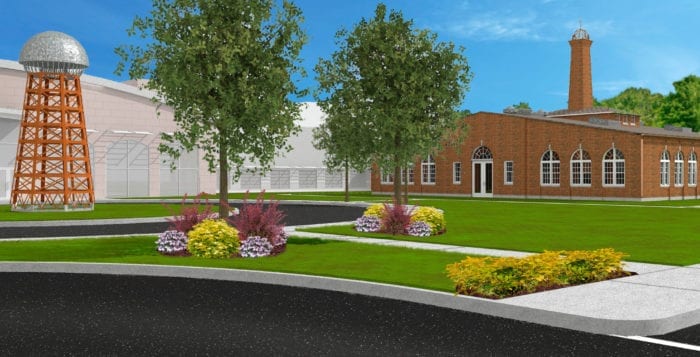By Kevin Redding

The Tesla Science Center at Wardenclyffe aims to be a major hub of exploration and innovation on Long Island, not only preserving Nikola Tesla’s life but actively helping to inspire the inventors of tomorrow. It is now another step closer to that thanks to the generosity of a local entrepreneur greatly inspired by the Serbian-American scientist.
During a celebration of the nonprofit’s long-term vision for its Shoreham site last month at the The Ward Melville Heritage Organization Educational & Cultural Center in Stony Brook, it was announced that Eugene Sayan — the founder and CEO of a Stony Brook-based health care efficiency company called Softheon Inc., will donate $1 million in support of the future museum, business incubator for scientific research and student-geared education facility.
With the donation, the center currently has $5 million of a $20 million capital campaign goal set up in March of this year. The funding will allow the center to begin phase one of its construction projects on the grounds of Tesla’s last remaining laboratory. The starting plan is to turn two abandoned buildings on the property into visitor and exhibition spaces for science education programs by next year, and renovate the historic, Stanford White-designed laboratory. Maintenance of the buildings and staff is also part of the overall budget.
“It’s truly amazing,” said Marc Alessi, the science center’s executive director, a driving force behind the center’s plans. “There’s certainly worldwide interest in this place, but Eugene’s donation is validation that there’s also an interest from local innovators in making sure this gets launched.”
Sayan, an Eastern European immigrant himself whose innovative company “strives to create simple solutions to complex problems,” has, unsurprisingly, always felt a strong connection to Tesla and looked to him as a source of inspiration while building his business. When he was made aware of Wardenclyffe during a meeting with the center’s national chair of fundraising Joe Campolo and learned of the plan to build something more than just a museum in Tesla’s name, he quickly involved himself in the effort. In the wake of Tesla Motors CEO Elon Musk’s $1 million donation to the center in 2014, Sayan wanted to be the first entrepreneur in the local area to make a significant contribution, while inspiring others to follow his lead.
“It’s an honor to support the Tesla Science Center and its celebration of the important work of Nikola Tesla,” Sayan said in a statement. “His work and innovation have made an impact on my life, and I’m very happy that Softheon is supporting such an important initiative on Long Island.”
Tesla Science Center President Jane Alcorn said Sayan’s benefaction, and others like it, will serve to successfully energize the legacy and impact of the inventor of alternating current electricity.
“Mr. Sayan is giving us support when we need it most,” Alcorn said. “We hope others will see the good that this can bring and consider giving a gift of this nature as well. Not everybody has the capacity to do something like this but when people who do have that ability act in a forward-thinking way like this, it benefits all of us. This contribution will make a real difference.”
The center’s board members estimate the entirety of their planned facility will be available to the public by 2022. Upon completion of the project, they said, not only will it include a museum and an immersive science center — including a STEM education program for students, TED Talk-style lectures and workshops for emerging scientists and entrepreneurs and traveling exhibits — it will house a Makerspace program offering lab rooms and classes in areas ranging from 3-D printing to synthetic fabrication and robotics. Incubator programs will also be set up to connect startup businesses from around the world to the site. If a company meets the center’s criteria, with Tesla-oriented focuses like electrical or mechanical engineering, its owners can apply for crowdsourcing and mentorships.
Plans are also in place to work with the Department of Education to implement Tesla into the K-12 science curriculums of surrounding school districts.
“Having a capability as a science center helps with sustainability,” he said. “People will keep coming back for family memberships, our new exhibits, to send their kids to robotics and coding classes. We eventually want to be the go-to source.”Alessi added that because the closest major regional science center, the Cradle of Aviation in Garden City, is a hike for North Shore residents, he hopes the science center will provide a similar experience for them.
He said it’s important the center become a place that would make its namesake proud.
“If Nikola Tesla walked onto this site after it’s opened and all we had was a museum dedicated to what he was doing 100 years ago, he would be ticked off,” Alessi said. “Just having a static museum here isn’t enough. On-site innovation really honors what Tesla was doing. [Tesla] was a futurist, he saw where things would go, and that’s what can inspire the Teslas of today and tomorrow. If you bring an 8-year-old child here who gets hands-on science experience, we’re going to inspire a future scientist. We want to help people see the value of science.”
Read it on TBR Newsmedia.